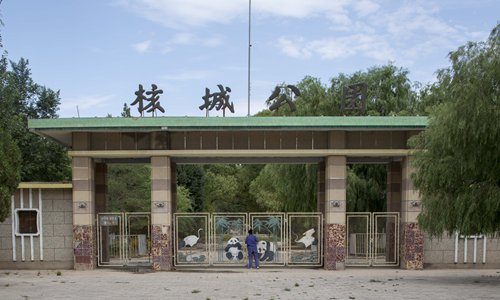
A woman looks through the rusty gates of an abandoned park in the center of 404. (Photo/Courtesy of Xu Haifeng)
Every day, taxi driver You Zhirong sits in front of a shop, waiting for his next customer.
Visitors hardly ever come to his hometown in Northwest China's Gansu Province. In fact, most don't even know how to get there.
The town is called 404 City by locals and it cannot be found on any public map. In 1958, the central government approved the building of China's first nuclear production factory coded 404 in the region and the town grew around it. The factory has performed many nuclear experiments and even made an atomic bomb.
The location of the town was a secret back then. People only knew it's located near Wuhuashan, which is about 50 kilometers from the factory. Yet it was a flourishing town. It had rows of houses, plenty of people, as well as its own farms to keep up food supplies.
"In the 1970s, 404 was like a small city," You told thepaper.cn. "The parks were full of people, couples held hands and children chased each other. But afterwards, all the other cities started rapidly developing and 404 started falling."
In 1996, China announced the end of nuclear experiments. The factory started shifting from military to civilian production and moved its workers to a nearby city, Jiayuguan. Since then, 404 became virtually deserted, with only about 1,000 people still lingering.
You is a second generation resident of the city. He grew up there, married there and stayed on because he feels attached.
When one walks on the streets of 404 nowadays, one can see many rusty gates and plants growing wild. In the town center, there's a zoo with empty cages and the descriptions of animals still attached. There is a statue of Chairman Mao, surrounded by hotels, post offices, hospitals, police stations and supermarkets, everything a normal city has. The only difference is most have not been used in years.


















































